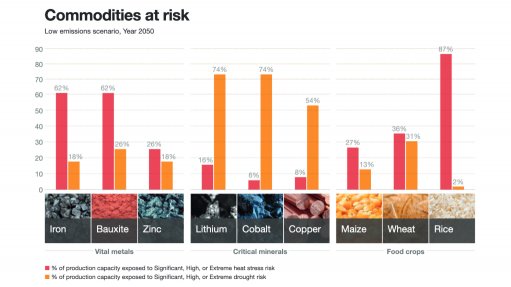GWEC outlines fives measures to combat energy, climate change crises
The Global Wind Energy Council (GWEC) has published a five-point action plan titled “Accelerating renewables to achieve energy security, affordability and climate action” to help policymakers steer a way out of the current energy and climate change crises.
The plan – addressing the need to restore order to energy markets while meeting climate goals and creating a secure, stable energy transition – was published on July 19 against the background of record temperatures globally and economic stress around the world driven by these crises.
A persistent heatwave has caused thousands of deaths in Spain and Portugal, while drought and wildfires have affected France, Italy, Greece, Croatia, Turkey and Morocco this year.
Historic high temperatures are hitting the UK, with temperatures in London exceeding a provisional 40 oC – a new all-time record, on July 19 – as well as the US, while India has experienced a series of heatwaves over recent months.
In addition, China endured its hottest June on record this year.
Meanwhile, the energy crisis has contributed to an economic crisis, massive civil unrest and political instability in Sri Lanka.
These events are connected, and symptomatic of a disorderly, volatile energy transition, states the GWEC. They highlight the need for urgent action to accelerate the deployment of renewable energy to ease economic pain, lower energy costs and put the world on a net-zero pathway.
Wind energy can be rapidly scaled up in the next few years to offer solutions to power price volatility, energy insecurity and fossil fuel dependency, while building a secure energy transition in the medium to long term, the council says.
GWEC CEO Ben Backwell says the world is facing twin crises of energy security and affordability on the one hand, and the threat of accelerating global heating on the other. “It needs to make a decisive shift away from fossil fuels, rather than prolonging reliance on them.”
He says the solution to these problems must be led by renewables, which can deliver clean and reliable electricity to citizens and businesses using the limitless, indigenous resources of the wind and the sun.
“Rapidly scaling wind energy can also provide enormous societal benefits, from additional jobs to inward investment to cleaner air and greater water security,” adds Backwell.
He adds that the world is witnessing policy and market misalignments in terms of achieving the energy transition, resolving the energy trilemma and delivering a green recovery in the wake of the Covid-19 pandemic.
“The five steps in this plan will help to ease some of the bottlenecks to renewables deployment caused by a lack of political will, overly lengthy permitting schemes or priority for incumbent polluting fossil fuels.
“Aligning policy with the recommendations can support governments in achieving an orderly transition and escape from the dangers of relying on fossil fuels,” says Backwell.
With five actions, the GWEC says, governments can enable “huge volumes of green energy” to ease the energy security and climate crises, while avoiding decisions which lock-in fossil fuel dependency and risk worse crises in the future.
The first measure involves urgently streamlining permitting to produce a huge increase in wind capacity in the next one to three years and build a net-zero-compatible project pipeline.
The second measure is to implement a grid access action plan to get large volumes of renewable energy connected, while the third involves introducing simplified mechanisms for clean power procurement and pricing to rapidly unlock investment.
The fourth measure involves avoiding locking in large-scale fossil fuel-based generation., while the fifth commits to firm energy transition plans and milestones to enable the renewables industry to plan for healthy supply chain development.
Comments
Press Office
Announcements
What's On
Subscribe to improve your user experience...
Option 1 (equivalent of R125 a month):
Receive a weekly copy of Creamer Media's Engineering News & Mining Weekly magazine
(print copy for those in South Africa and e-magazine for those outside of South Africa)
Receive daily email newsletters
Access to full search results
Access archive of magazine back copies
Access to Projects in Progress
Access to ONE Research Report of your choice in PDF format
Option 2 (equivalent of R375 a month):
All benefits from Option 1
PLUS
Access to Creamer Media's Research Channel Africa for ALL Research Reports, in PDF format, on various industrial and mining sectors
including Electricity; Water; Energy Transition; Hydrogen; Roads, Rail and Ports; Coal; Gold; Platinum; Battery Metals; etc.
Already a subscriber?
Forgotten your password?
Receive weekly copy of Creamer Media's Engineering News & Mining Weekly magazine (print copy for those in South Africa and e-magazine for those outside of South Africa)
➕
Recieve daily email newsletters
➕
Access to full search results
➕
Access archive of magazine back copies
➕
Access to Projects in Progress
➕
Access to ONE Research Report of your choice in PDF format
RESEARCH CHANNEL AFRICA
R4500 (equivalent of R375 a month)
SUBSCRIBEAll benefits from Option 1
➕
Access to Creamer Media's Research Channel Africa for ALL Research Reports on various industrial and mining sectors, in PDF format, including on:
Electricity
➕
Water
➕
Energy Transition
➕
Hydrogen
➕
Roads, Rail and Ports
➕
Coal
➕
Gold
➕
Platinum
➕
Battery Metals
➕
etc.
Receive all benefits from Option 1 or Option 2 delivered to numerous people at your company
➕
Multiple User names and Passwords for simultaneous log-ins
➕
Intranet integration access to all in your organisation

















